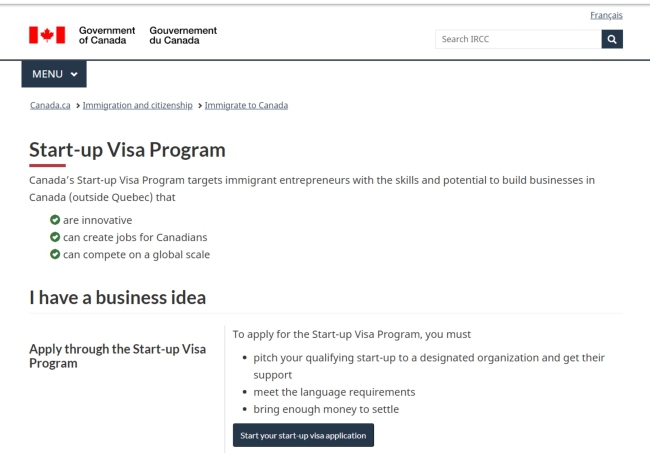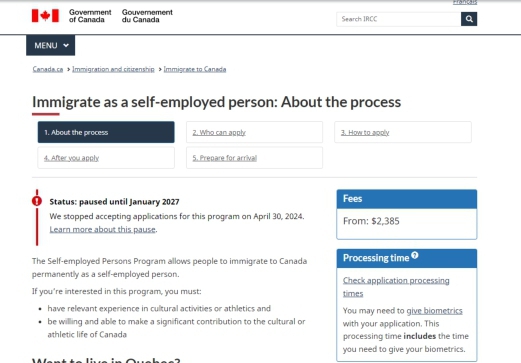Canada Startup Visa vs Self-Employed Work Permit: For Entrepreneurs
Canada Startup Visa vs Self-Employed Work Permit: For Entrepreneurs
When considering entrepreneurial immigration to Canada, two primary pathways stand out for business-minded individuals: the Canada Startup Visa Program and the Self-Employed Work Permit. As an aspiring entrepreneur, it’s important to understand these options thoroughly to make an informed decision that aligns with your business goals and personal circumstances.
This guide will explore both options in detail, starting with the Canada Startup Visa Program. My goal is to provide you with comprehensive, accurate information to help you navigate these choices effectively.
Read: Canada Work Visa Pitfalls: 5 Missteps That You Should Avoid
Canada Startup Visa Program
 The Canada Startup Visa Program, launched in 2013, is designed to attract innovative entrepreneurs to Canada. Its primary objective is to stimulate economic growth by attracting business founders with the potential to build dynamic companies that can compete globally.
The Canada Startup Visa Program, launched in 2013, is designed to attract innovative entrepreneurs to Canada. Its primary objective is to stimulate economic growth by attracting business founders with the potential to build dynamic companies that can compete globally.
Key elements of the program include
- Program Overview and Objectives
- Aims to link immigrant entrepreneurs with private sector organizations in Canada that have experience working with startups
- Focuses on creating jobs for Canadians and driving economic growth through innovation
- Eligibility Requirements: a) Business Idea and Innovation:
- Your business concept must be innovative, scalable, and have potential for job creation in Canada
- The idea should be more than just a small or lifestyle business
b) Support from Designated Organizations
- You must secure support from a designated organization in Canada
- These can be venture capital funds, angel investor groups, or business incubators
- The support validates the potential of your business idea
c) Language Proficiency
- Proof of language skills in either English or French is required
- You must meet a minimum of Canadian Language Benchmark (CLB) level 5
d) Proof of Funds
- You need to demonstrate sufficient funds to settle in Canada
- As of 2024, the requirement is CAD 13,750 for a single applicant, with additional amounts for family members
- This is separate from your business investment funds
- Application Process
- Obtain a letter of support from a designated organization
- Submit a comprehensive application to Immigration, Refugees and Citizenship Canada (IRCC)
- Undergo a thorough review of your business plan, background, and financial capacity
- Benefits of the Startup Visa
- Direct path to permanent residency for successful applicants
- Ability to live and work anywhere in Canada
- Access to Canada’s universal healthcare system and other social benefits
- No conditions on the success of your business for maintaining permanent residency
- Challenges and Considerations
- Highly competitive program with stringent requirements
- Significant time and effort required to develop a compelling business plan
- No guarantee of business success despite obtaining the visa
- May require substantial personal and financial commitment
The Canada Startup Visa Program offers a unique opportunity for entrepreneurs with innovative ideas and the backing to potentially realize them. However, it’s important to carefully assess whether your business concept and personal circumstances align with the program’s requirements and objectives.
In the next section, we’ll explore the Self-Employed Work Permit option, providing you with a comprehensive view of your choices as an entrepreneur looking to establish a business in Canada.
Read: Skilled Worker Visa vs Study Permit: Comparing Canada Work Options
Self-Employed Work Permit
 The Self-Employed Work Permit is another avenue for entrepreneurs seeking to establish themselves in Canada. This program caters to individuals who intend to be self-employed in Canada and can significantly contribute to the country’s economy.
The Self-Employed Work Permit is another avenue for entrepreneurs seeking to establish themselves in Canada. This program caters to individuals who intend to be self-employed in Canada and can significantly contribute to the country’s economy.
The Self-Employed Work Permit program aims to attract experienced business owners and entrepreneurs who can create employment for themselves and potentially for others in Canada. It’s designed to support individuals who have the skills and resources to establish or purchase a business in Canada.
Eligibility Requirements
- Relevant Experience:
- Applicants must have at least two years of relevant experience in the field they intend to work in Canada.
- This experience should be recent, typically within the five years preceding the application.
- Intent to Create Own Job
- You must demonstrate a clear intention and ability to create your own employment in Canada.
- This involves presenting a viable business plan or proposal for your intended venture.
- Significant Contribution to the Canadian Economy
- Your proposed business activities should show potential for economic, social, or cultural benefits to Canada.
- This could include job creation, introducing innovative services or products, or contributing to a specific sector of the Canadian economy.
Application Process
- Submit an application to Immigration, Refugees and Citizenship Canada (IRCC).
- Provide detailed documentation of your business experience, qualifications, and intended business activities in Canada.
- Include a comprehensive business plan outlining your proposed venture in Canada.
Benefits of the Self-Employed Work Permit
- Allows entrepreneurs to establish or purchase a business in Canada.
- Provides the flexibility to work in various sectors, depending on your skills and experience.
- It can be a stepping stone towards permanent residency through other immigration programs.
Challenges and Considerations
- Does not provide an immediate pathway to permanent residency.
- Requires ongoing proof of self-employment and economic contribution.
- There may be limitations on the types of business activities permitted.
Comparison of the Two Programs
To help you make an informed decision, let’s compare the Canada Startup Visa Program and the Self-Employed Work Permit across several key factors:
- Target Audience:
- Startup Visa: Aimed at innovative entrepreneurs with scalable business ideas, often in technology or high-growth sectors.
- Self-Employed Permit: Suited for experienced business owners or entrepreneurs across a broader range of industries, including traditional sectors.
- Application Complexity:
- Startup Visa: Generally more complex, requiring support from designated organizations and a highly innovative business concept.
- Self-Employed Permit: Relatively less complex, but still requires a solid business plan and proof of relevant experience.
- Processing Times:
- Startup Visa: This can be longer due to the evaluation of the business concept and involvement of designated organizations.
- Self-Employed Permit: Often faster, but processing times can vary based on individual circumstances and application completeness.
- Pathway to Permanent Residency:
- Startup Visa: Offers a direct path to permanent residency upon approval.
- Self-Employed Permit: Does not directly lead to permanent residency but can be a stepping stone to other immigration programs.
- Flexibility in Business Operations:
- Startup Visa: Provides more flexibility in terms of business growth and pivoting, as long as it remains innovative.
- Self-Employed Permit: May have more restrictions on the type and scope of business activities.
- Support Systems Available:
- Startup Visa: Comes with support from designated organizations, potentially providing mentorship and networking opportunities.
- Self-Employed Permit: Generally doesn’t include formal support systems, but applicants can seek assistance from business associations and community organizations.
Both the Canada Startup Visa Program and the Self-Employed Work Permit offer unique opportunities for entrepreneurs looking to establish themselves in Canada. The Startup Visa is geared towards innovative, high-growth potential businesses with a direct path to permanent residency. In contrast, the Self-Employed Permit provides a broader entry point for experienced entrepreneurs across various sectors, with the potential to transition to permanent residency through other programs like express entry.
Your choice between these options should be based on your business concept, experience, long-term goals in Canada, and the level of support you require. Consult an immigration professional to determine which pathway best aligns with your entrepreneurial vision and personal circumstances.
Read: Your Ultimate Guide to Canada Study Permits: Everything You Need to Know
Factors to Consider When Choosing
 When deciding between the Canada Startup Visa Program and the Self-Employed Work Permit, several key factors should influence your decision:
When deciding between the Canada Startup Visa Program and the Self-Employed Work Permit, several key factors should influence your decision:
- Nature of your business:
- If your business is highly innovative and scalable, the Startup Visa may be more appropriate.
- For more traditional or service-based businesses, the Self-Employed Permit might be a better fit.
- Stage of your entrepreneurial journey:
- Early-stage entrepreneurs with groundbreaking ideas may find the Startup Visa more suitable.
- Established business owners or those with significant industry experience might lean towards the Self-Employed Permit.
- Long-term goals in Canada
- If immediate permanent residency is a priority, the Startup Visa offers this advantage.
- If you’re open to other pathways to permanent residency and want to establish your business first, the Self-Employed Permit could be a good starting point.
- Financial resources
- The Startup Visa often requires more substantial financial backing, including support from designated organizations.
- The Self-Employed Permit may be more accessible financially but still requires proof of ability to establish a viable business.
- Time constraints
- Consider the processing times for each program and how they align with your timeline for moving to Canada.
- The Startup Visa process can be longer due to the need for support from designated organizations.
Expert Opinions
Insights from immigration lawyers and consultants:
- Sarah Thompson, Immigration Lawyer: “The Startup Visa is ideal for tech-savvy entrepreneurs with disruptive ideas. However, it’s crucial to have a solid business plan and secure support from designated organizations. The Self-Employed Permit, while less glamorous, can be a more straightforward option for experienced business owners in traditional industries.”
- Michael Chen, Immigration Consultant: “In my experience, the choice often comes down to the entrepreneur’s readiness for the Canadian market. The Startup Visa demands a higher level of innovation and potential for rapid growth. The Self-Employed Permit is more suitable for those with a proven track record in their field who want to replicate their success in Canada.”
Recommendations from successful applicants:
- Aisha Patel, Startup Visa recipient: “The Startup Visa process was challenging but rewarding. The support from the designated organization was invaluable in navigating the Canadian business landscape. If you have a truly innovative idea and are ready for rapid growth, it’s worth the effort.”
- Carlos Rodriguez, Self-Employed Permit holder: “The Self-Employed Permit allowed me to establish my consulting business in Canada with relative ease. While it doesn’t offer immediate permanent residency, it provided a solid foundation for me to grow my business and explore other immigration options later.”

plasse give me visa place help me please help jop
i need a work visa
I need job canada
I wish to be there for work
God bless you
I’m looking job
work visa apply..
please i want work visa
I need job overseas
i have interest work for the canada